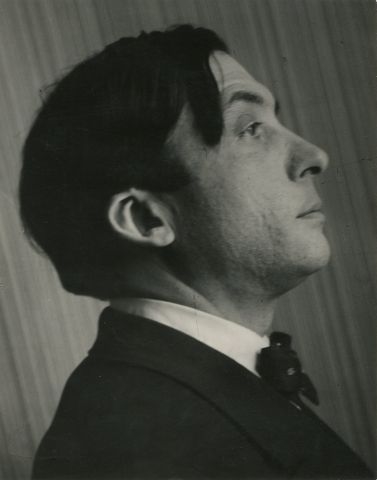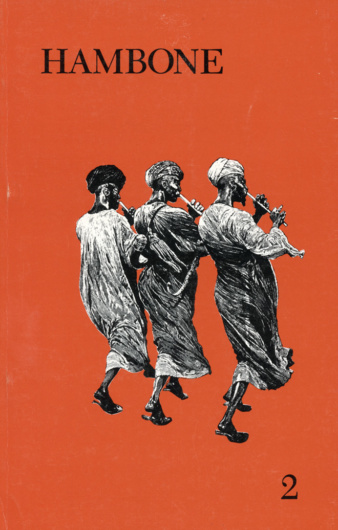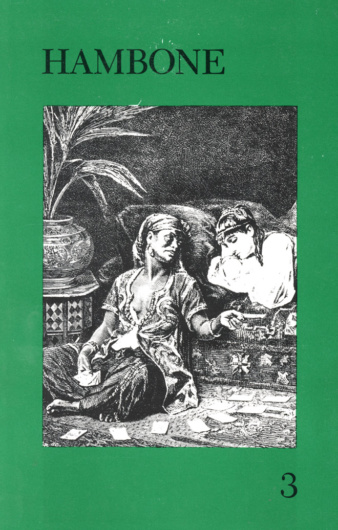photograph by Brassai, 1937
photograph by Brassai, 1937

translated by lydia davis
In the warm air of the ceiling the footlights of dreams are illuminated.
The white walls have curved. The burdened chest breathes confused words. In the mirror, the wind from the south spins,
carrying leaves and feathers. The window is blocked. The heart is
almost extinguished among the already cold ashes of the moon — the hands are without shelter — as all the trees lying down. In the wind from the desert the needles bend and my hour is past.

portrait by Brassai, 1932
from painted stars (Étoiles peintes, 1921)
Movement on the horizon
The horsemen keep to the road, and in profile. One cannot tell any more how many. Against the night that blocks the way, between the river and the bridge, a weeping spring, a tree that follows you. You could watch the passing crowd and it wouldn’t see you. It’s a veritable army on the march, or else a dream, a background of a painting on a cloud. The child cries or sleeps. It watches or dreams. All these armies obstruct the sky. The earth shakes. The horses glide along the water; the cortège glides, too, in the water that washes away all these colors, all these tears.
Translation by Dan Bellm
Hartley "Textual Politics" - On Stein: "She does not write in order to
enclose (define, delimit, decipher) the world but to move within it;
in other words, she does not function according to the static
determinism of the noun but through the process of relationship."
Juxtaposition important; meaning in relation. Political lang poets:
McGann, "Contemp Poetry, Alt Routes" - Lang poets repudiate linear
and/or chornological narrative, and use instead anti-narrative and
non-narrative. Lang writing is actually constructive in its
demolition of the conventional relation between the active
(dictatorial) writer and the passive (victimized reader)--against the
"I know, you don't," "I have, you want," "I give, you take" writer-
reader relationship. Thinks of political life and learning
(government-citizen and teacher-student relations) in the same way.
Lang writing attempts to draw reader into production process by
leaving connections between various elements open, thus allowing
reader to help produce those connections.
Bernstein, "Whose Language" (P) - ..by leaving connections between
various elements open, thus allowing reader to help produce those
connections. John Cage: "Studying being interrupted."
Bernstein's "Dysraphism" (B) - "I felt the abridgement of
imperatives....Morose or comotose." (Jackson Mac Low: healthy for
meaning to think of words as sounds: "But can I specify anything
beyond sounds? Words gives "'the sensation of meaning,'" but can I
connect the meanings of the words as readily as I find their sounds
connected?"
Howe from My Emily (B) - Who polices questions of grammar? Commends
"breaking the law just short of breaking off communication." Tom
Mandel's "Realism": "The text guards the door to the reading room."
Armantrout, "Lang of Love" (P) - If lang (e.g. sexual political lang)
is forever exfoliated and encoded, then "understanding" is itself one
of those words. Coming on to you, "The boss could say / 'parameters' /
and mean something / like 'I'll pinch.'"
Silliman, "Albany" (B) - linear chronological autobiographical
narrative is bullshit.
John Cage: "Constellations of ideas (five as a minimum)." Narrative
essence = having a goal; but, per John Cage, "Goal is not to have a
goal." "This" is the one thing that will save America. Make it new =
renew contract with America: "Sign here and the ink will fade in
conditions of its own choosing, an icon overcome by the conditions of
its control" (Tom Mandel, "Realism"). See the back of this page.
Kathleen Fraser, "re:searches" (P) - same attitude against
chronological autobiography as Silliman. "Not random, these /
crystalline structures, these / non-reversible orders...this language
we come up against."
Carla Harryman, "Realism" & Tom Mandel, "Realism" (P) - Pomo lang is
not only meaningful but is in fact a form of realism superior to what
we customarily call realism, a mimesis (imitation) not of the external
object but of the perceptual process itself. John Cage:
"Art=imitation of nature in her manner of operation."
Dick Higgins, "New Song in an Old Style" (1967)
(check one) __ speak __ dance When I __ fall in love __ grow old (check one) __ I'm going to be __ it'll be with (check one) __ an apple. __ a lover. __ a smile. __ you.
My Emily Dickinson (excerpt)
In the college library I use there are two writers whose work refuses to conform to the Anglo-American literary traditions these institutions perpetuate. Emily Dickinson and Gertrude Stein are clearly among the most innovative precursors of modernist poetry and prose, yet to this day canonical criticism from Harold Bloom to Hugh Kenner persists in dropping their names and ignoring their work. Why these two pathfinders were women, why American--are questions too often lost in the penchant for biographical detail that "lovingly" muffles their voices. One, a recluse, worked without encouragement or any real interest from her family and her peers. Her poems were unpublished in her lifetime. The other, an influential patron of the arts, eagerly courted publicity, thrived on company, and lived to enjoy her own literary celebrity. Dickinson and Stein meet each other along paths of the Self that begin and end in contradiction. This surface scission is deceptive. Writing was the world of each woman. In a world of exaltation of his imagination, feminine inscription seems single and sudden.
As poetry changes itself it changes the poet's life. Subversion at- tracted the two of them. By 1860 it was as impossible for Emily Dickinson simply to translate English poetic tradition as it was for Walt Whitman. In prose and in poetry she explored the implications of breaking the law just short of breaking off communication with a reader. Starting from scratch, she exploded habits of standard human intercourse in her letters, as she cut across the customary chronological linearity of poetry. Gertrude Stein (1874-1946), influenced by Cezanne, Picasso and Cubism, verbally elaborated on visual invention. She reached in words for new vision formed from the process of naming, as if a first woman were sounding, not describing, "space of time filled with moving." Repetition, surprise, alliteration, odd rhyme and rhythm, dislocation, deconstruction. To restore the original clarity of each word-skeleton both women lifted the load of European literary custom. Adopting old strategies, they reviewed and re-invented them.
Emily Dickinson and Gertrude Stein also conducted a skillful and ironic investigation of patriarchal authority over literary history. Who polices questions of grammar, parts of speech, connection, and connotation? Whose order is shut inside the structure of a sentence? What inner articulation releases the coils and complications of Saying's assertion? In very different ways the countermovement of these two women's work penetrates to the indefinite limits of written communication.
Perhaps the word that occurs oftenest in the Stanzas is the word "they," for this is a poem about the world, about "them." (What a pleasant change from the eternal "we" with which so many modern poets automatically begin each sentence, and which gives the impression that the author is sharing his every sensation with some invisible Kim Novak.) Less frequently, "I" enters to assess the activities of "them," to pick up after them, to assert his own altered importance. As we get deeper into the poem, it seems not so much as if we were reading as living a rather long period of our lives with a houseful of people. Like people, Miss Stein's lines are comforting or annoying or brilliant or tedious. Like people, they sometimes make no sense and sometimes make perfect sense; or they stop short in the middle of a sentence and wander away, leaving us alone for awhile in the physical world, that collection of thoughts, flowers, weather, and proper names. And, just as with people, there is no real escape from them: one feels that if one were to close the book one would shortly re-encounter the Stanzas in life, under another guise. As the author says, "It is easily eaten hot and lukewarm and cold / But not without it."
Stanzas in Meditation gives one the feeling of time passing, of things happening, of a "plot," though it would be difficult to say precisely what is going on. Sometimes the story has the logic of a dream:
She asked could I be taught to be allowed
And I said yes oh yes I had forgotten him
And she said does any or do any change
And if not I said whom could they count.
while at other times it becomes startlingly clear for a moment, as though a change in the wind had suddenly enabled us to hear a conversation that was taking place some distance away:
He came early in the morning.
He thought they needed comfort
Which they did
And he gave them an assurance
That it would be all as well
As indeed were it
Not to have it needed at any time
But it is usually not events which interest Miss Stein, rather it is their "way of happening," and the story of Stanzas in Meditation is a general, all-purpose model which each reader can adapt to fit his own set of particulars. The poem is a hymn to possibility; a celebration of the fact that the world exists, that things can happen.
In its profound originality, its original profundity, this poem that is always threatening to become a novel reminds us of the late novels of James, especially The Golden Bowl and The Sacred Fount, which seem to strain with a superhuman force toward "the condition of music," of poetry. In such a passage as the following, for instance:
Be not only without in any of their sense
Careful
Or should they grow careless with remonstrance
Or be careful just as easily not at all
As when they felt.
They could or would would they grow always
By which not only as more as they like.
They cannot please conceal
Nor need they find they need a wish
we are not far from Charlotte's and the Prince's rationalizations. Both Stanzas in Meditation and The Golden Bowl are ambitious attempts to transmit a completely new picture of reality, of that real reality of the poet which Antonin Artaud called "une realite dangereuse et typique." If these works are highly complex and, for some, unreadable, it is not only because of the complicatedness of life, the subject, but also because they actually imitate its rhythm, its way of happening, in an attempt to draw our attention to another aspect of its true nature. Just as life is being constantly altered by each breath one draws, just as each second of life seems to alter the whole of what has gone before, so the endless process of elaboration which gives the work of these two writers a texture of bewildering luxuriance -- that of a tropical rain-forest of ideas -- seems to obey some rhythmic impulse at the heart of all happening.
In addition, the almost physical pain with which we strive to accompany the evolving thought of one of James's or Gertrude Stein's characters is perhaps a counterpart of the painful continual projection of the individual into life. As in life, perseverance has its rewards -- moments when we emerge suddenly on a high plateau with a view of the whole distance we have come. In Miss Stein's work the sudden inrush of clarity is likely to be an aesthetic experience, but (and this seems to be another of her "points") the description of that experience applies also to "real-life" situations, the aesthetic problem being a microcosm of all human problems.
I should think it makes no difference
That so few people are me.
That is to say in each generation there are so few geniusesAnd why should I be one which I am
This is one way of saying how do you do
There is this difference
I forgive you everything and there is nothing to forgive.
It is for moments like this that one perseveres in this difficult poem, moments which would be less beautiful and meaningful if the rest did not exist, for we have fought side by side with the author in her struggle to achieve them.
from Stanzas in Meditation: Stanza 83
Navajo Animal Songs
1.
Chipmunk can't drag it along
can't drag it along
Chipmunk holds back his ears
2.
Chipmunk was standing
jerking his feet
with stripes
he's a very short chipmunk
3.
Mole makes his pole redhot
Says: I'll shove it up your ass
Says: feel how it shakes your belly
4.
Wildcat was walking
He ran down here
He got his feet in the water
He farted
Wow, wow! says Wildcat
5.
A turkey is dancing near the rocks
shoves out his pelvis
woops-a-daisy we all go crazy
6.
Big Rabbit goes to see his baby
pisses
pissing all around him
7.
Pinionjay shits pebbles
now he's empty
English versions by Jerome Rothenberg, after David McAllester
A Whole Foods in Hawai‘i
rotten porch slanted forward to the ground, among vines, with a nice old rocking chair that I sat in every morning to read my Diamond Sutra. The yard was full of tomato plants about to ripen, and mint, mint, every-thing smelling of mint, and one fine old tree that I loved to sit under and meditate on those cool perfect starry California October nights unmatched anywhere in the world. We had a perfect little kitchen with a gas stove, but no icebox, but no matter. We also had a perfect little bathroom with a tub and hot water, and one main room, covered with pillows and floor mats of straw and mattresses to sleep on, and books, books, hundreds of books everything from Catullus to Pound to Blyth to albums of Bach and Beethoven (and even one swing-ing Ella Fitzgerald album with Clark Terry very interesting on trumpet) and a good three-speed Webcor phonograph that played loud enough to blast the roof off: and the roof nothing but plywood, the walls too, through which one night in one of our Zen Lunatic drunks I put my fist in glee and Coughlin saw me and put his head through about three inches. About a mile from there, way down Milvia and then upslope."

I can’t write a nature poem bc that conversation happens in the Hall of
South American Peoples in the American Museum of Natural History
btwn two white ladies in buttery shawls as they pass a display case of
“traditional” garb from one tribe or another it doesn’t really matter to anyone
and that word Natural in Natural History hangs
also History
also Peoples
hangs as in frames
it’s horrible how their culture was destroyed
as if in some reckless storm
but thank god we were able to save some of these artifacts—history is so
important. Will you look at this metalwork? I could cry—
Look, I’m sure you really do just want to wear those dream catcher
earrings. They’re beautiful. I’m sure you don’t mean any harm, I’m sure
you don’t really think abt us at all. I’m sure you don’t understand the
concept of off-limits. But what if by not wearing a headdress in yr music
video or changing yr damn mascot and perhaps adding .05% of personal
annoyance to yr life for the twenty minutes it lasts, the 103 young ppl
who tried to kill themselves on the Pine Ridge Indian reservation over
the past four months wanted to live 50% more
I don’t want to be seen, generally, I’m a natural introvert, n I def don’t
want to be seen by white ladies in buttery shawls,
but I will literally die if I don’t scream
*
An NDN poem must reference alcoholism, like
I started drinking again after Mike Brown and Sandra Bland and Charleston
I felt so underwater it made no sense to keep dry
Then summer said goodbye
to the station. Lifting its cap,
the thunder took souvenirs,
hundreds of shots on the fly.
The lilac went black. And that
instant, gathering whole armfuls
of lightning, the far clearing lit
the white station-master’s shack.
And when the whole roof ran
with a fierce torrent of malice,
and, like charcoal onto a sketch,
the rain crashed down on the fence,
consciousness started to flash,
here, it seems, flooding in play
even the corners of mind
where it’s always bright as day.
Translation by A.S. Kline
Nathaniel Mackey
Santa Cruz, California
Nos. 1–21 (Spring 1974, 1982–2015).
HAMBONE’S LINEAGE INCLUDES the poetry of Black Mountain, the San Francisco Renaissance, language poetry, and the myths and traditions of West and North Africa, Haiti, and Papua/New Guinea, as well as the history and rhythms of blues, jazz, and improvisatory music. Editor Nathaniel Mackey was born in Miami and grew up in Southern California, before attending both Princeton and Stanford universities. While at Stanford in 1974, he was one of the editors of the first issue of Hambone, which was not to appear again until 1982 when, as a better-established poet and scholar, Mackey revived the periodical (he has since gone on to publish a half dozen books of poetry, an anthology of jazz poetry, and, in 1993, a highly regarded critical work, Discrepant Engagement: Dissonance, Cross-Culturality, and Experimental Writing).
The revived Hambone reflects the wide interests of its editor in “cross-cultural” and experimental writing as well as writing by people of color (two of Mackey’s cultural heroes are Imamu Amiri Baraka and Guyanese novelist Wilson Harris). Mackey commented on his role as editor in an interview with Chris Funkhouser published in the print magazine Callaloo and at the Electronic Poetry Center from SUNY-Buffalo: “my idea was to simply put my sense of a community of writers and artists on a kind of map, in one place. So in Hambone 2, in which all of the material was solicited, that meant having a talk by Sun Ra and poems by Robert Duncan, poems by Beverly Dahlen, Jay Wright, fiction by Clarence Major, Wilson Harris, poems by Edward Kamau Brathwaite and so on. That issue was sort of saying, ‘OK, here’s my map, a significant part of it, and we’re going to call it Hambone.’ It seems to me that’s what little magazines do, and do best. They put out a particular editor’s sense of ‘what’s up’ out there—and you find out who ‘out there’ is interested in that.”

Hambone 2 (1982).

Hambone 3 (1983).
Song of the Andoumboulou: 55
—orphic fragment—
Santa Fe Trail I go separately The sweet knees of oxen have pressed a path for me ghosts with ingots have burned their bare hands it is th...
